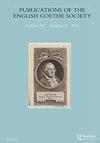(德)建构民族主义:解读托马斯·曼《威尼斯之死》(1912)、《混乱与早期里德》(1925)、《马里奥与巫师》(1929)中的反讽
IF 0.1
3区 文学
0 LITERATURE, GERMAN, DUTCH, SCANDINAVIAN
引用次数: 0
摘要
摘要在欧洲民族主义时代的大背景下,托马斯·曼的《威尼斯的陶德》(1912)、《Unordnung und frühes Leid》(1925)和《Mario und Der Zauberer》(1929)揭示了叙事在身份话语建构中的权威性。本文通过分析曼恩特有的反讽与种族化话语的产生之间的相互关系,来引起人们对德国民族身份建构本质的关注。这种身份被揭示是由殖民地的差异比喻所支撑的,这些差异同时构成了欧洲内部的等级制度。然而,讽刺并不是简单地肯定一种自然主义或固定的文化权威等级制度,而是在叙事层面阐明了规范是如何在社会和文本上构建的,进而是不稳定的。通过这种方式,在文化真理和社会小说之间的区别问题上,本文探讨了作品在多大程度上质疑规范实际上是规范的。本文章由计算机程序翻译,如有差异,请以英文原文为准。
(De)constructing Nationalism: Understanding Irony in Thomas Mann’s Der Tod in Venedig (1912), Unordnung und frühes Leid (1925), and Mario und der Zauberer (1929)
ABSTRACT In the background of the European era of nationalism, Thomas Mann’s Der Tod in Venedig (1912), Unordnung und frühes Leid (1925), and Mario und der Zauberer (1929) reveal the authority of narrative in the discursive construction of identity. By analysing the interrelation of Mann’s characteristic irony and productions of discourses of racialization, this essay draws attention to the constructed nature of German national identity. This identity is revealed to be underpinned by colonial tropes of difference which simultaneously structure internal European hierarchies. Yet, far from simply affirming a naturalistic or fixed hierarchy of cultural authority, irony at a narrative level elucidates how norms are both socially and textually constructed, and, by extension, unstable. In this way, troubling the distinction between cultural truths and social fictions, this essay explores the way in which the works problematize to what extent norms are, in fact, normative.
求助全文
通过发布文献求助,成功后即可免费获取论文全文。
去求助
来源期刊

Publications of the English Goethe Society
LITERATURE, GERMAN, DUTCH, SCANDINAVIAN-
CiteScore
0.10
自引率
0.00%
发文量
15
 求助内容:
求助内容: 应助结果提醒方式:
应助结果提醒方式:


